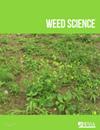Occurrence and Management of Herbicide Resistance in Annual Vegetable Production Systems in North America
IF 2.1
2区 农林科学
Q2 AGRONOMY
引用次数: 0
Abstract
Abstract Herbicide resistance has been studied extensively in agronomic crops across North America but is rarely examined in vegetables. It is widely assumed that the limited number of registered herbicides combined with the adoption of diverse weed management strategies in most vegetable crops effectively inhibits the development of resistance. It is difficult to determine whether resistance is truly less common in vegetable crops or whether the lack of reported cases is due to the lack of resources focused on detection. This review highlights incidences of resistance that are thought to have arisen within vegetable crops. It also includes situations in which herbicide-resistant weeds were likely selected for within agronomic crops but became a problem when vegetables were grown in sequence or in adjacent fields. Occurrence of herbicide resistance can have severe consequences for vegetable growers, and resistance management plans should be adopted to limit selection pressure. This review also highlights resistance management techniques that should slow the development and spread of herbicide resistance in vegetable crops.北美一年生蔬菜生产系统中除草剂抗性的发生与管理
摘要北美各地的农学作物对除草剂的抗性进行了广泛的研究,但很少在蔬菜中进行检测。人们普遍认为,注册除草剂的数量有限,加上大多数蔬菜作物采用了不同的杂草管理策略,有效地抑制了抗性的发展。很难确定抗性在蔬菜作物中是否真的不那么常见,或者报告病例的缺乏是否是由于缺乏专注于检测的资源。这篇综述强调了被认为在蔬菜作物中出现的抗性发生率。它还包括在农艺作物中可能选择抗除草剂杂草的情况,但当蔬菜按顺序种植或在相邻的田地中种植时,这就成了一个问题。除草剂抗性的发生可能会对蔬菜种植者产生严重后果,应采取抗性管理计划来限制选择压力。这篇综述还强调了应减缓蔬菜作物中除草剂抗性发展和传播的抗性管理技术。
本文章由计算机程序翻译,如有差异,请以英文原文为准。
求助全文
约1分钟内获得全文
求助全文
来源期刊

Weed Science
农林科学-农艺学
CiteScore
4.60
自引率
12.00%
发文量
64
审稿时长
12-24 weeks
期刊介绍:
Weed Science publishes original research and scholarship in the form of peer-reviewed articles focused on fundamental research directly related to all aspects of weed science in agricultural systems. Topics for Weed Science include:
- the biology and ecology of weeds in agricultural, forestry, aquatic, turf, recreational, rights-of-way and other settings, genetics of weeds
- herbicide resistance, chemistry, biochemistry, physiology and molecular action of herbicides and plant growth regulators used to manage undesirable vegetation
- ecology of cropping and other agricultural systems as they relate to weed management
- biological and ecological aspects of weed control tools including biological agents, and herbicide resistant crops
- effect of weed management on soil, air and water.
 求助内容:
求助内容: 应助结果提醒方式:
应助结果提醒方式:


